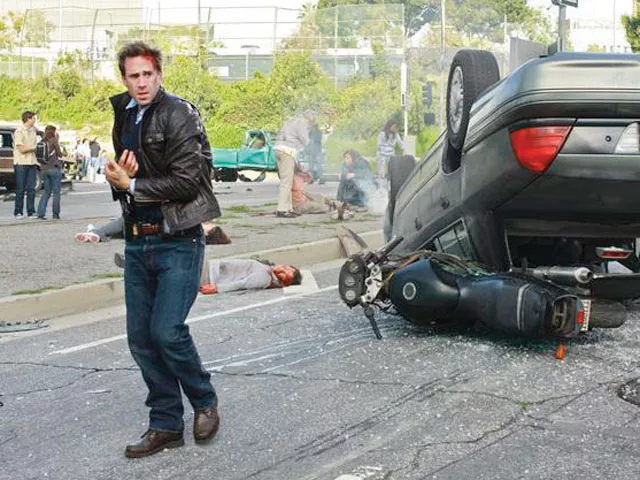The first episode of FlashForward should have come with a spoiler warning: In a catastrophic event, every single person on Earth blacks out for exactly 2 minutes, 17 seconds. During the blackout, each person sees six months into the future.
A senator sees herself as president. A dad sees his daughter, thought dead. A wife sees her marriage falling apart; a recovering alcoholic sees himself drunk. One FBI agent sees nothing, sparking fears of impending death.
It’s a fun concept — but instantly constraining. The “surefire prediction of the future” gimmick isn’t exactly new to fiction. Anyone who’s seen Lost, Heroes, Angel, Minority Report, 12 Monkeys, Back to the Future, Left Behind, or A Christmas Carol knows there are only three ways a future prediction can go.
FlashForward (Thursdays, 8 pm, ABC)
A) The prediction fails, usually for arbitrary reasons. B) The prediction is correct, but in a twisty way. C) The future prediction comes true exactly. Usually, for maximum irony, efforts to escape fate end up causing it. (Because if it were escapable, then it wouldn’t be fate, would it?) If A), then the show’s entire premise collapses; if B), it’s obnoxious; and if C), then the suspense of “What comes next?” evaporates.
There’s a reason why flashbacks are usually boring. They rip us out of the narrative flow. They freeze story progression. And they’re usually predictable. (We know exactly where the characters will end up.)
A flash-forward, however, turns the present into flashback. The whole show suddenly becomes prologue.
Think of how, in a House episode, you know that the diagnosis of “lupus” is wrong, because the TV clock says there’s still 20 minutes left in the episode. For FlashForward, we’re still waiting, checking off the episodes, until the “six months later” finally rolls around.
When Lost used flash-forwards, they worked. Lost had the guts to actually detonate an atomic bomb to test the can-you-change-thefuture question. Lost’s characters are interesting enough we care about the journey, not just the slog toward the inevitable destination.
But in FlashFoward, the characters — distinguishable mainly by differing accents — aren’t much more than exposition-delivery vehicles.
In Lost, we care about John Locke and Ben Linus. They’re weird dudes. In FlashForward, we don’t care about Generic FBI Guys No. 7 and No. 9. They’re brooding; they’re boring.
We’d stick around to find out where the story ends. But thanks to the blackout visions, that mystery’s probably been spoiled.
TIVO-WORTHY
The League With Judd Apatow-style straightguy friendship comedies hot right now, it makes sense to theme an entire series around fantasy football (Dungeons & Dragons for jocks). The League, however, tries to go for the loose-scripted feel of an Apatow comedy. Without a Paul Rudd-quality actor, half the scenes play like improv class. (Thursdays, 10:30 pm, FX)
Seth & Alex’s Almost Live Comedy Show Family Guy creator Seth McFarlane likes offensive jokes. In fact, usually “offensive” is the joke. So for his live special, expect McFarlane to continue his tradition of sticking it to those who have it coming — like gays, blacks, Mexicans, Jews, Christians, the disabled, the deaf, the poor, the unattractive and any given female. (Sunday, Nov. 8, 8:30 pm, Fox)
The Wanda Sykes Show Fox looked upon the television landscape and saw that besides Leno, Conan, Fallon, Kimmel, Letterman, Stewart, DeGeneres, Colbert, Beck, O’Reilly, Olbermann and The View, there were practically no talk shows. And for some reason they chose Wanda Sykes to remedy that. (Premieres Saturday, Nov. 7, 11 pm, Fox)























